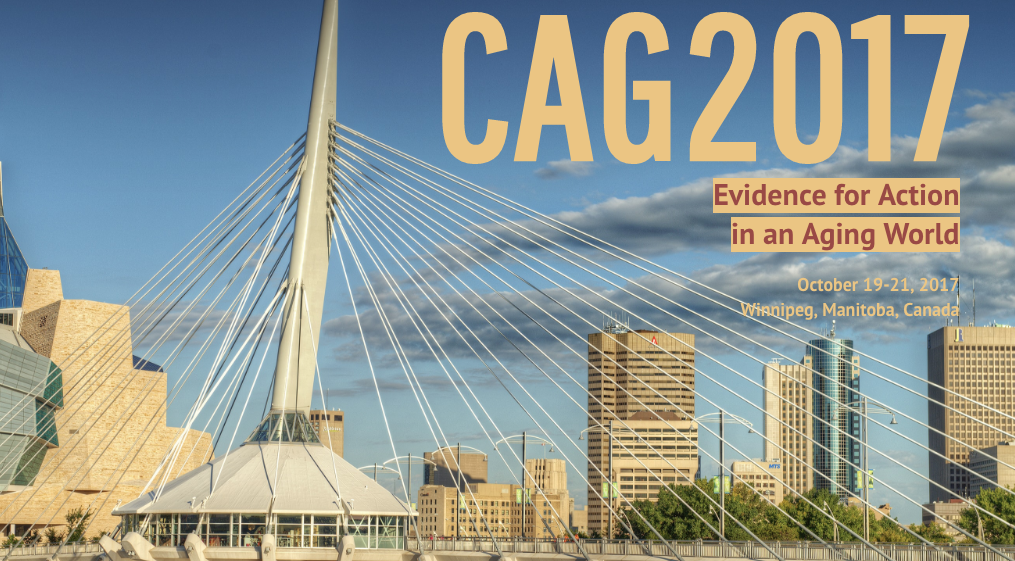Held from October 19th-21st 2017 in Winnipeg, The University of Manitoba and their Centre on Aging successfully hosted the 46th annual Canadian Association of Gerontology Conference (CAG). At this year’s meeting, delegates from across Canada and farther afield gathered to discuss the conference theme: “Evidence for Action in an Aging World”*. This year’s program offered a variety of topics and themes such as: health and social care, clinical practice, training and education, cognition, participation and inclusion, supportive relationships, and environments of ageing. With insightful keynotes on “Scholarship and Synergy: the Humanities and Ageing” by Dr. Desmond O’Neill, an engaging and informative presentation by Dr. Carrie Bourassa on Noojimo Mikana “(a Healing Path): Research and Reconciliation” and finally an eye opening address on “Quality of Life and Ageing in Nigeria: Prospects and Challenges of Implementing the WHO Global Strategy and Action Plan on Ageing and Health” by Dr. Emem Omokaro, the programme offered a bit for everyone.
As with CAG meetings in previous years, caregiving, dementia, and long-term care, rapidly emerged as key conference themes. These three domains are all important priority areas in need of further scholarship, as each of these present practical implications for Canada’s aging population. Many delegates focused on how to provide ‘evidence for action’, with discussions addressing the emotional challenges of caregiving, managing dementia-related behaviours, and active participation and communication between residents, families, and staff in long-term care. However, we wondered about the extent to which critical perspectives and theoretical insights were threaded, not only within these themes, but across the conference.
At the opening keynote of CAG 2017, by Dr. O’Neill, there was a call to link humanities, critical and cultural perspectives, and how scholars can better achieve this balance in future inquiry. This keynote address served as a model of ‘good practice’ in how to embed critical perspectives into our research and practice. For instance, O’Neill called for more attention to the words gerontological researchers use and how the meanings of these words are taken up in society at large. One such example is how the discourse of caregiver burden, that is ever present, brings attention to the emotional toll of caregiving, but in doing so, frames caregiving negatively, overlooking some of the positive and/or rewarding aspects of caregiving. Another example was evident in a session chaired by Dr. Pia Kontos entitled “Dementia and the arts.” Herein, dance, cultural dimensions of global aging, elder clowning, theatre, and digital storytelling were discussed as means of understanding and challenging stigmas about dementia, adding valuable cultural contributions to the field of gerontology. As students in the field, we wonder how we might be able to better integrate critical and cultural perspectives into the inter-disciplinary discussions that take place on a yearly basis at the annual conference.
As we approach next year’s conference with the theme of “Making It Matter: Mobilizing Aging Research, Practice & Policy,” we must – as an Association – continue to attend to the priority areas in gerontological research whilst considering the heterogeneity of the aging process. By utilizing a thoughtful and critical lens on dominant discourses and social narratives of aging, we can work to holistically understand and translate research findings in communities, society and policies in ways that ultimately- ‘Make it matter’.
* We would like to thank CAG’s Legacy fund, the Gilbrea Centre for Studies in Aging, and the Department of Health, Aging and Society at McMaster University for providing us with the opportunity (and funds) to engage with leading scholars in our field and learn more about the inspiring work being done in and across Canada- a true hub of aging research.

